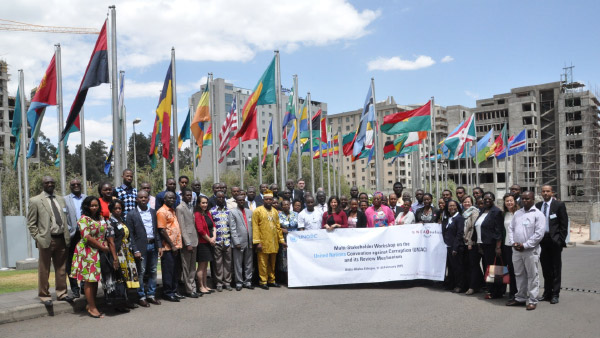20 October 2015, by Mirella Dummar Frahi, UNODC.

The group of NGO representatives and government focal points that participated in the UNCAC workshop, February 2015, Addis Ababa, Ethiopia.
Following the adoption of the UNCAC Review Mechanism in 2010, it became immediately apparent that government representatives would require training to support its implementation.
In addition, UNODC and other stakeholders recognised that a successful Review Mechanism would also require effective civil society participation. So, in 2011 UNODC in partnership with the UNCAC Coalition (with Transparency International acting as the Secretariat) developed a project to provide training to non-governmental organisations (NGOs), aiming to promote an inclusive UNCAC process in line with Article 13.
To date, we organised 10 UNCAC training sessions and have equipped 248 NGO representatives from 96 countries with the technical knowledge and advocacy tools to work constructively with their respective governments and the private sector to combat corruption and implement the UNCAC.
The training has enabled NGOs to effectively understand the provisions of the Conventions and its Review Mechanism. In turn, they have developed their own training and best practices and shared these with other NGOs and stakeholders in their countries. An important outcome of this training has been the opportunity for some NGOs – as in the case of Contas Abertas in Brazil – to establish initial contacts with government focal points for the Review Mechanism, facilitating joint work on the reviews and follow-up.
In 2014, following a recommendation by a mid-term independent evaluation, the project initiated multi-stakeholder workshops for joint sessions with NGOs and government focal points. The new format of the training increased trust between governments and NGOs, often translated into invitations for NGOs to participate in the country visit as was the case with Ethiopia.
There were also cases where longer-term collaboration was established.In one example, representatives from the Gabonese NGOs Réseau des organisations libres de la société civile pour la bonne gouvernance (ROLBG) and Brainforest built excellent working relations with their government counterparts, thanks to their knowledge and expertise on the UNCAC. This collaboration resulted in their involvement in a number of consultations at country level and in the development of a national anti-corruption strategy, along with other stakeholders such as the UNDP and the private sector.
A second example came as a direct result of the multi-stakeholder workshop held in South-East Asia in February 2014. During the workshop the government and NGO participants drafted an action plan that became a catalyst in the government’s adoption of the inter-agency approach later that year. As a result, in September 2014 the Philippine government created the Presidential UNCAC Inter-Agency Committee, composed of high-level officials and multi-stakeholder participants (NGOs, private sector and academia). The aim was to oversee the implementation, coordination, monitoring and review of Philippine compliance with the UNCAC.
In sum, the multi-stakeholder workshops have proved to be instrumental in initiating dialogue and building trust between governments and NGOs. The exchange of best practices and knowledge-sharing has triggered a more inclusive Review Mechanism. In light of the agenda item on civil society participation at the sixth session of the Conference of the States Parties, it will be important for civil society to build on this positive experience of dialogue and partnership with governments in the first cycle of the Review Mechanism and to provide constructive recommendations for the second cycle.
About Mirella Dummar Frahi
Mirella Dummar Frahi is Civil Society Team Leader at the United Nations Office on Drugs and Crime (UNODC).



